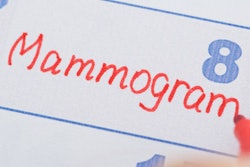
Mammography false positives are considered to be one of the harms of regular breast cancer screening. But receiving false-positive results doesn't seem to affect women's long-term anxiety -- and, in fact, may boost their intention to continue screening, according to a new study published online in JAMA Internal Medicine.
A research team led by Anna Tosteson, ScD, of the Dartmouth Institute for Health Policy assessed the effect of false-positive mammograms on women's quality of life by measuring personal anxiety and attitudes toward future screening. The group analyzed data collected during the Digital Mammographic Imaging Screening Trial (DMIST).
 Anna Tosteson, ScD.
Anna Tosteson, ScD.
The DMIST data were acquired in telephone surveys conducted shortly after screening at 22 sites; 1,226 randomly selected women with positive and negative mammogram results were enrolled. Follow-up interviews were obtained from 1,028 of the women (534 with negative results, 494 with false-positive results). Survey participants completed the six-question Spielberger State-Trait Anxiety Inventory (STAI) and the EuroQol EQ-5D, a test that measures health outcomes (JAMA Intern Med, April 21, 2014).
Women's short-term anxiety did spike after a false-positive mammography result, with 50.6% reporting moderate or higher anxiety levels. But a year later, women who had received a false-positive result showed no statistically significant anxiety compared with those who had not, Tosteson said.
"Our study shows that in this measure, short-term anxiety after a mammography false positive, had no long-term effect on health," she told AuntMinnie.com.
And although anxiety and discomfort were higher among women with false-positive mammograms than among those with negative exams, these findings seemed to have no effect on women's plans to undergo mammography in the next two years: 93.5% of the study participants intended to continue screening, the group wrote. In fact, Tosteson's team found that women who experienced a false-positive mammogram stated they would be more likely to undergo future breast cancer screening (25.7%) compared with those who experienced a negative mammogram (14.2%).
"These women didn't experience the false positive as so harmful that they would be dissuaded from breast cancer screening in the future," Tosteson told AuntMinnie.com. "Their anxiety was transient and had no measurable impact on overall health. This suggests that it's not necessary to adjust for the harm of false positives on health when evaluating the cost-effectiveness of screening programs."
Anxiety following inconclusive test results is real and natural, and experts in breast imaging continue to work to reduce the number of false-positive mammography exams, the American College of Radiology (ACR) and the Society of Breast Imaging (SBI) said in a statement on the new study. But it's not so harmful that screening should be avoided.
"[The study] proves that patients experience short-term anxiety regarding test results and that these feelings rapidly decline over time," the ACR and the SBI stated. "The study also shows that there are no measurable effects to women's health from experiencing a false-positive exam as some have previously claimed. ... In terms of benefits versus harms of breast cancer screening, short-term anxiety regarding test results does not equate to dying from breast cancer."
The study adds to the literature about the short-term psychological impact of false-positive mammograms for women, said Dr. Lydia Pace of Brigham and Women's Hospital in Boston. On April 2, she and colleague Dr. Nancy Keating published a literature review in an attempt to clear the confusion of the breast screening debate by summarizing what is known about the benefits and risks of mammography (Journal of the American Medical Association, April 2, 2014, Vol. 311:13, pp. 1327-1335).
"Because false positives are so common, and many women did anticipate quite a bit of anxiety if they had a false positive, this study highlights the importance of counseling women about the likelihood of false positives when making decisions about mammography screening," Pace told AuntMinnie.com via email. "It would be interesting to see if thorough counseling and guidance about the probability of a false positive might decrease a woman's anxiety if she does have a positive mammogram."
Women do need to know how common false-positive mammography results are, according to Tosteson: 40% to 60% of women who undertake regular screening over 10 years will experience a false positive that results in additional testing -- or biopsy.
"Screening, especially for younger women, still comes down to a woman's choice, how she feels about the possibility of a false-positive result," Tosteson said.



















